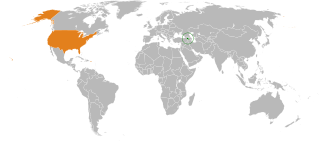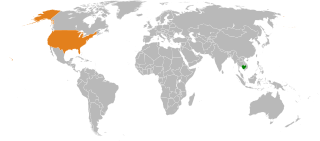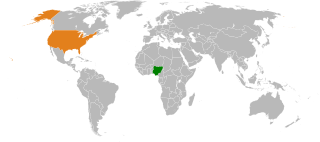
In the United States Government, the Bureau of East Asian and Pacific Affairs is part of the United States Department of State and is charged with advising the Secretary of State and Under Secretary of State for Political Affairs on matters of the Asia-Pacific region, as well as dealing with U.S. foreign policy and U.S. relations with countries in the region. It is headed by the Assistant Secretary of State for East Asian and Pacific Affairs, who reports to the Under Secretary of State for Political Affairs.

Argentina and the United States have maintained bilateral relations since the United States formally recognized the United Provinces of the Río de la Plata, the predecessor to Argentina, on January 27, 1823.

The dissolution of the Soviet Union in December 1991 brought an end to the Cold War and created an opportunity for establishing bilateral relations between the United States with Armenia and other post-Soviet states as they began a political and economic transformation. The United States recognized the independence of Armenia on 25 December 1991, and opened an embassy in Armenia's capital Yerevan in February 1992.

The diplomatic relationship between the United States of America and Zambia can be characterized as warm and cooperative. Relations are based on their shared experiences as British colonies, both before, after and during the struggle for independence. Several U.S. administrations cooperated closely with Zambia's first president, Kenneth Kaunda, in hopes of facilitating solutions to the conflicts in Rhodesia (Zimbabwe), Angola, and Namibia. The United States works closely with the Zambian Government to defeat the HIV/AIDS pandemic that is ravaging Zambia, to promote economic growth and development, and to effect political reform needed to promote responsive and responsible government. The United States is also supporting the government's efforts to root out corruption. Zambia is a beneficiary of the African Growth and Opportunity Act (AGOA). The U.S. Government provides a variety of technical assistance and other support that is managed by the Department of State, U.S. Agency for International Development, Millennium Challenge Account (MCA) Threshold Program, Centers for Disease Control and Prevention, Department of Treasury, Department of Defense, and Peace Corps. The majority of U.S. assistance is provided through the President's Emergency Plan for AIDS Relief (PEPFAR), in support of the fight against HIV/AIDS.

U.S.–Uzbekistan relations formally began when the United States recognized the independence of Uzbekistan on December 25, 1991, and opened an embassy in Tashkent in March 1992. U.S.-Uzbekistan relations developed slowly and reached a peak following the U.S. decision to invade Afghanistan following the September 11, 2001 attacks. Relations cooled significantly following the "color revolutions" in the former Soviet republics of Georgia, Ukraine, and Kyrgyzstan in 2003–2005, and the Government of Uzbekistan sought to limit the influence of U.S. and other foreign non-governmental organizations (NGOs) working on civil society, political reform, and human rights inside the country.

Bilateral relations between the United States and Cambodia, while strained throughout the Cold War, have strengthened considerably in modern times. The U.S. supports efforts in Cambodia to combat terrorism, build democratic institutions, promote human rights, foster economic development, eliminate corruption.

Cameroon–United States relations are international relations between Cameroon and the United States.

Relations between Cyprus and the United States can be described as excellent, both sharing membership in the United Nations, International Monetary Fund, the Organization for Security and Co-operation in Europe, the World Bank and the World Trade Organization. Cyprus has been an observer to the Organization of American States.

Kyrgyzstan – United States relations are bilateral relations between Kyrgyzstan and the United States.

The United States and North Macedonia enjoy excellent bilateral relations.

Mozambique – United States relations are bilateral relations between Mozambique and the United States.

The United States established official relations with Nepal in 1947 and opened its Kathmandu embassy in 1959. Relations between the two countries have always been friendly. U.S. policy objectives toward Nepal center on helping Nepal build a "peaceful, prosperous, and democratic society."

Bilateral relations between the Federal Republic of Nigeria and the United States of America were formally inaugurated when Nigeria attained its independence from Britain in 1960. In the 21st century, they have entailed an important, if occasionally uneasy, alliance, following a more chequered diplomatic past. Nigeria has traditionally been among the United States's most important partners in Africa, and together the countries' populations account for more than half a billion people.

Sudan–United States relations are the bilateral relations between Sudan and the United States. The United States government has been critical of Sudan's human rights record and has dispatched a strong UN Peacekeeping force to Darfur. Relations between both countries in recent years have greatly improved, with Sudan's post-revolutionary government compensating American victims of al-Qaeda terror attacks, the removal of Sudan from the State Department's blacklist of state sponsors of terrorism and the United States Congress having reinstated Sudan's sovereign immunity in December 2020.

Tanzania – United States relations are bilateral relations between Tanzania and the United States.

Laos–Vietnam relations refers to the current and historical relationship between the Lao People's Democratic Republic and Socialist Republic of Vietnam. The relationship, although seen as better than Vietnam-Cambodia ties, are still prescient with negative feelings, especially as Vietnam and China vie for influence in Laos.
The U.S.–China Strategic and Economic Dialogue (S&ED) was a high-level dialogue for the United States and China to discuss a wide range of regional and global strategic and economic issues between both countries. The establishment of the S&ED was announced on April 1, 2009, by U.S. President Barack Obama and Chinese President Hu Jintao. The upgraded mechanism replaced the former Senior Dialogue and Strategic Economic Dialogue started under the George W. Bush administration. High-level representatives of both countries and their delegations will met annually at capitals alternating between the two countries.

Earl Anthony Wayne is an American diplomat. Formerly Assistant Secretary of State for Economic and Business Affairs, Ambassador to Argentina and Deputy Ambassador to Afghanistan, Wayne served nearly four years as Ambassador to Mexico. He was nominated by President Obama and confirmed by the Senate in August, 2011. He departed Mexico City for Washington July 31, 2015 and retired from the State Department on September 30, 2015. Wayne attained the highest rank in the U.S. diplomatic service: Career Ambassador. He is currently a Professorial Lecturer and Distinguished Diplomat in Residence at American University's School of International Service where he teaches courses related to diplomacy and US foreign policy. Wayne also works with the Woodrow Wilson International Center for Scholars, the Atlantic Council, the Center for Strategic and International Studies,. Wayne is co-chair of the Mexico Institute's Advisory Board at the Wilson Center. He is also on the board of the American Academy of Diplomacy and the Public Diplomacy Council of America. Wayne is an independent consultant, speaker and writer and works with several not-for-profit professional associations. He was an adviser for HSBC Latin America on improving management of financial crime risk from 2015 until 2019 and served on the board of the American Foreign Service Association from 2017 to 2019.
U.S. President Barack Obama's East Asia Strategy (2009–2017), also known as the Pivot to Asia, represented a significant shift in the foreign policy of the United States since the 2010s. It shifted the country's focus away from the Middle Eastern and European sphere and allowed it to invest heavily and build relationships in East Asian and Southeast Asian countries, especially countries which are in close proximity to the People's Republic of China (PRC) either economically, geographically or politically to counter its rise as a rival superpower.
Legacies of War, is a fiscally sponsored project of NEO Philanthropy, Inc (NEO), dedicated to raising awareness about the history of the Vietnam War-era bombing in Laos and advocate for the clearance of unexploded bombs, (UXO) and survivor assistance, to provide space for healing the wounds of war, and to create greater hope for a future of peace.





































